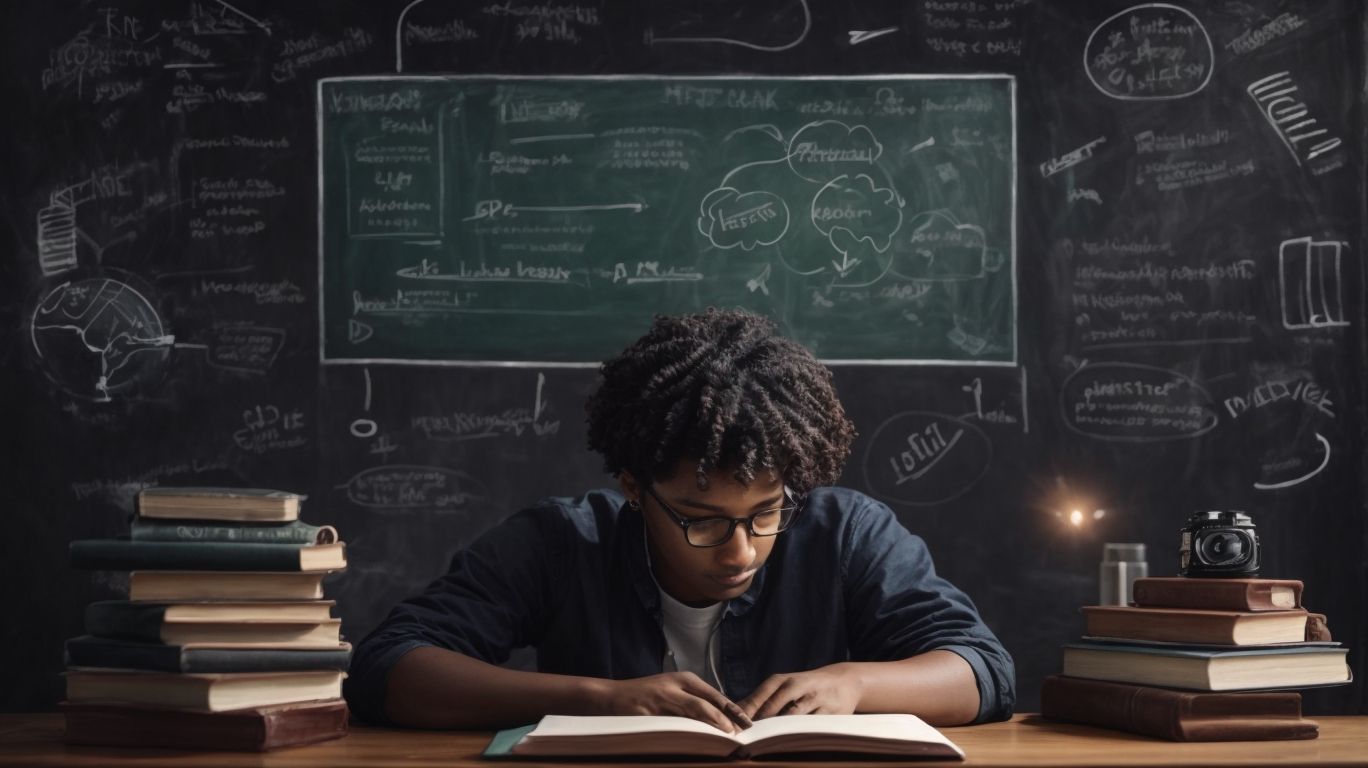Have you ever wondered what educational psychology is all about? In this article, we will explore the major areas of study within this field, including human development, motivation, teaching, assessment, and more.
We will discuss how educational psychology is applied in various educational settings, such as curriculum design, classroom management, student counseling, and technology integration. Join us as we delve into the fascinating world of educational psychology and its impact on education.
Contents
- 1 What is Educational Psychology?
- 2 What are the Major Areas of Study in Educational Psychology?
- 3 How is Educational Psychology Applied in Education?
- 4 Frequently Asked Questions
- 4.1 What is educational psychology?
- 4.2 What are the main areas of study in educational psychology?
- 4.3 How is educational psychology applied in the classroom?
- 4.4 Why is understanding educational psychology important for educators?
- 4.5 How does educational psychology contribute to the development of educational policies?
- 4.6 What are some current applications of educational psychology?
What is Educational Psychology?
Educational Psychology is a field that focuses on understanding how people learn and the various factors that influence the learning process. Educational psychologists study the cognitive, behavioral, and developmental perspectives of learning.
Cognitive learning theory focuses on how mental processes such as thinking, memory, and problem-solving impact learning outcomes.
Behavioral learning theory, on the other hand, emphasizes the role of external stimuli and reinforcement in shaping behavior.
Developmental learning theory explores how learning processes evolve over a person’s lifespan, considering stages of cognitive and emotional growth.
Prominent figures in educational psychology include Jean Piaget, known for his work on cognitive development, Lev Vygotsky, who introduced the concept of sociocultural theory, and John Dewey, a proponent of experiential learning.
What are the Major Areas of Study in Educational Psychology?
Educational Psychology encompasses various major areas of study that focus on human development, learning, motivation, teaching methods, assessment, and evaluation.
Human development plays a crucial role in educational psychology as it examines how individuals grow and change physically, cognitively, and emotionally throughout their lives.
Understanding motivation is essential for educators and psychologists to support students in achieving their goals.
Effective teaching methods are a key focus area, ensuring instructors employ strategies that cater to diverse learning styles.
Assessment techniques are crucial for evaluating student progress and informing instructional decisions.
Knowledge of individual differences helps psychologists tailor interventions to meet the unique needs of each learner.
Considering social contexts is vital, as schools are influenced by the broader society and culture.
Utilizing various research methods allows educational psychologists to gather data, analyze findings, and contribute to evidence-based practices.”
Human Development and Learning
Human Development and Learning in educational psychology explore the cognitive, behavioral, and developmental perspectives of learning, emphasizing the importance of theories such as cognitivism, behaviorism, and constructivism.
These perspectives delve into how individuals acquire knowledge, develop problem-solving skills, and evolve throughout their lifespan. Children are often at the heart of these studies, showcasing the pivotal role that early experiences play in shaping their future abilities and behaviors.
Motivation and Learning
Motivation and Learning are essential aspects of educational psychology, focusing on understanding how motivation impacts academic success and learning outcomes.
Research in educational psychology has shown that student motivation plays a crucial role in their learning process. Various motivational techniques have been identified to enhance student engagement, such as offering rewards and recognition for their achievements. Factors that influence student motivation can range from personal interest in the subject to the learning environment, teacher support, and peer relationships.
By addressing these factors, educators can create a more motivating learning atmosphere, leading to improved academic performance and sustained learning. Strategies like setting clear goals, providing constructive feedback, and encouraging self-efficacy have been found to boost student motivation and overall success in educational endeavors.
Teaching and Instruction
Teaching and Instruction in educational psychology involve exploring effective teaching methods, instructional design principles, cognitive development theories, and the application of social constructivism in the classroom.
Effective teaching methods encompass a variety of strategies, including differentiated instruction, cooperative learning, and active learning techniques.
Instructional design principles focus on creating engaging and interactive learning experiences that cater to diverse learning styles and preferences.
Cognitive development theories, such as Piaget’s theory of cognitive development and Vygotsky’s sociocultural theory, provide insights into how students acquire knowledge and understanding.
The role of social constructivism emphasizes the importance of collaborative learning experiences, peer interaction, and scaffolding to facilitate knowledge construction in a social context.
Assessment and Evaluation
Assessment and Evaluation in educational psychology focus on the development and application of educational theories, research methods, and tools to assess student learning and evaluate educational outcomes.
One key aspect of educational psychology is understanding how different educational theories shape assessment practices. For example, behaviorism emphasizes observable behaviors as indicators of learning, while constructivism focuses on learners’ active construction of knowledge. By drawing on these theories, educators can design assessment methods that align with their underlying beliefs about how students learn.
Educational psychologists often utilize a variety of research techniques, such as observational studies, surveys, and controlled experiments, to evaluate the effectiveness of educational interventions and programs.Research in this field plays a crucial role in providing evidence-based recommendations for enhancing educational practices and improving student outcomes.
Individual Differences and Special Needs
Individual Differences and Special Needs in educational psychology address the diverse learning needs of students, including those in special education programs and gifted learners.
Understanding and acknowledging the unique requirements of each student ensures that educators can tailor their teaching approaches effectively. For students in special education programs, providing individualized support and accommodations is crucial. This may involve creating personalized learning plans, implementing assistive technologies, or offering additional one-on-one guidance.
On the other hand, catering to the needs of gifted learners involves challenging them with enriched material, allowing for acceleration in certain subjects, and fostering creativity and critical thinking skills. Strategies such as differentiated instruction, flexible grouping, and project-based learning can be utilized to meet the diverse needs of these students.
Social and Cultural Contexts
Social and Cultural Contexts in educational psychology explore the impact of social constructivism and cultural factors on learning outcomes, shaping educational theories and practices.
Social constructivism emphasizes the importance of social interactions, collaborative learning, and shared understanding in education. Learners construct knowledge through interactions with others, rather than passively receiving it. This approach recognizes the influence of cultural backgrounds, beliefs, and values on learning experiences. Educational theories, such as Vygotsky’s Zone of Proximal Development, are adapted to acknowledge different cultural norms and practices, ensuring that learning environments are inclusive and relevant to diverse learners. By integrating cultural contexts into educational psychology, educators can create more meaningful and effective learning experiences for students.
Research Methods and Statistics
Research Methods and Statistics in educational psychology play a crucial role in understanding educational theories and practices, providing empirical evidence to support advancements in the field.
Through the use of research methods, educational psychologists can systematically investigate different aspects of learning and behavior in educational settings. By employing various statistical analyses, researchers can derive meaningful interpretations from data, helping to identify patterns, trends, and relationships within the educational context.
The application of empirical research allows educators and policymakers to make informed decisions based on evidence rather than mere intuition. This approach helps in validating educational theories, shaping curriculum development, and implementing effective teaching strategies.
How is Educational Psychology Applied in Education?
Educational Psychology is applied in various educational contexts such as curriculum development, classroom management, special education programs, and integrating technology into learning experiences.
For example, in curriculum design, educational psychologists use their knowledge of cognitive and developmental processes to create engaging and effective learning materials. They consider factors such as student learning styles, motivation, and memory retention when designing curriculum to maximize educational outcomes.
In classroom management, strategies derived from educational psychology help teachers create a positive and inclusive learning environment. Techniques like positive reinforcement, behavior modification, and collaborative learning structures are rooted in psychological principles that enhance student engagement and success.
Regarding special education accommodations, the principles of educational psychology come into play to tailor learning experiences to the diverse needs of students. Individualized education plans (IEPs) are developed based on psychological assessments, aiming to support students with disabilities and learning differences.
The integration of educational technology in teaching practices is informed by educational psychology research. Understanding how students interact with digital tools, the impact of multimedia on learning, and effective use of virtual environments is crucial for educators seeking to enhance engagement and academic performance.
Curriculum Design and Development
Curriculum Design and Development in educational psychology involve creating effective educational programs that align with learning objectives and pedagogical principles, often integrating educational technology for enhanced learning experiences.
This process entails a thorough analysis of learners’ needs and characteristics, followed by the establishment of clear educational goals and instructional strategies. Utilizing various educational technologies such as interactive whiteboards, online learning platforms, and educational software, curriculum designers aim to deliver engaging and personalized learning experiences.
Ongoing assessment and reflection are crucial in the curriculum development cycle to ensure that the instructional materials and methods remain relevant and effective. In today’s digital age, the integration of educational technology not only enhances classroom instruction but also promotes lifelong learning skills and digital literacy among students.
Classroom Management and Behavior Modification
Classroom Management and Behavior Modification in educational psychology focus on applying behavioral theories to enhance classroom dynamics, support teachers in maintaining effective learning environments, and modify student behaviors.
One key strategy based on behavioral theories is the implementation of clear and consistent rules and expectations within the classroom setting. When students understand what is expected of them and the consequences of their actions, it promotes a sense of structure and predictability, contributing to a positive learning atmosphere.
Educational psychologists play a crucial role in assisting teachers by providing insights into individual student behavior patterns, helping identify underlying issues that may be causing disruptions, and suggesting tailored interventions to address specific behavioral challenges.
Student Counseling and Support Services
Student Counseling and Support Services in educational psychology emphasize providing guidance, counseling, and mental health support to students, collaborating with educational psychologists, teachers, and other professionals for holistic student well-being.
These services play a crucial role in helping students navigate academic challenges, personal issues, and emotional growth. Educational psychologists work closely with teachers and counselors to identify individual student needs and develop tailored intervention strategies. By fostering a collaborative approach, these professionals can create a supportive environment that nurtures both academic success and mental well-being.
Teacher Training and Professional Development
Teacher Training and Professional Development in educational psychology focus on enhancing educators’ skills, knowledge, and teaching methods through structured training programs, workshops, and continuing education opportunities.
Teacher training and professional development are crucial elements in the field of education, as they equip teachers with the necessary tools to adapt to changing learning environments, implement innovative teaching strategies, and address the diverse needs of students. By participating in specialized courses and workshops, educators can delve deeper into educational psychology theories and practices, enabling them to create inclusive classrooms and foster a conducive learning atmosphere.
Ongoing professional development not only enhances teachers’ instructional capabilities but also opens up doors for career advancement and specialization. Educators can choose from a variety of career paths, such as becoming instructional coaches, curriculum developers, or school administrators, all of which demand a solid foundation in educational psychology and continuous learning to stay abreast of the latest trends in the field.
Educational Policy and Reform
Educational Policy and Reform in educational psychology involve analyzing and influencing educational policies, advocating for systemic changes, and promoting organizational learning to enhance educational outcomes.
Educational psychologists play a vital role in this process by applying principles of cognitive, social, and emotional development to understand how students learn best and how teaching practices can be optimized.
By conducting research, designing interventions, and providing professional development, they help educators implement evidence-based practices that align with the latest educational policies and strategies.
Parenting and Family Education
Parenting and Family Education in educational psychology focus on supporting parents in understanding child development, fostering positive parent-child relationships, and collaborating with educational psychologists to promote effective parenting strategies.
Effective parenting strategies play a crucial role in shaping a child’s behavior, emotional well-being, and overall success in academics and social interactions. By equipping parents with knowledge about child psychology, educators give the power to them to create a supportive environment that nurtures their child’s growth. Educational psychologists can offer insights into behavior management techniques, learning styles, and cognitive development, which parents can integrate into their parenting practices. Collaboration between educational psychologists, teachers, and families ensures a comprehensive approach to addressing children’s needs both at home and in school.
Technology and Learning
Technology and Learning in educational psychology explore the integration of educational technology, cognitive psychology principles, and innovative learning methods to enhance student engagement, learning outcomes, and academic success.
This fusion of technology and learning strategies offers educators a myriad of opportunities to create dynamic and interactive learning environments that cater to the diverse needs of students. By leveraging educational technology, teachers can personalize instruction, provide immediate feedback, and adapt learning materials to suit different learning styles. The integration of technology allows for the incorporation of multimedia resources, simulations, and virtual experiences, which can significantly enhance students’ understanding and retention of complex concepts.
Frequently Asked Questions
What is educational psychology?
Educational psychology is a branch of psychology that focuses on understanding how people learn and develop in educational settings. It involves the study of various psychological theories and principles to enhance teaching and learning strategies.
What are the main areas of study in educational psychology?
The main areas of study in educational psychology include learning and cognition, motivation and engagement, social and emotional development, and individual differences. Each of these areas provides insight into how students learn and develop in different educational contexts.
How is educational psychology applied in the classroom?
Educational psychology is applied in the classroom in various ways, such as developing effective teaching strategies, creating a supportive learning environment, and understanding and addressing individual student needs. It also involves the use of assessment and evaluation techniques to measure student progress and identify areas for improvement.
Why is understanding educational psychology important for educators?
Understanding educational psychology is essential for educators as it provides them with a theoretical foundation and practical strategies to effectively teach and support students. It also helps educators identify and address potential learning and behavioral issues in the classroom.
How does educational psychology contribute to the development of educational policies?
Educational psychology plays a crucial role in the development of educational policies by providing evidence-based research and data. This information is used to inform decision-making processes and create policies that support student learning and development.
What are some current applications of educational psychology?
Some current applications of educational psychology include the use of technology in education, the implementation of inclusive education practices, and the development of social-emotional learning programs. Educational psychology also continues to inform the creation of effective teaching and learning strategies in various educational settings.



